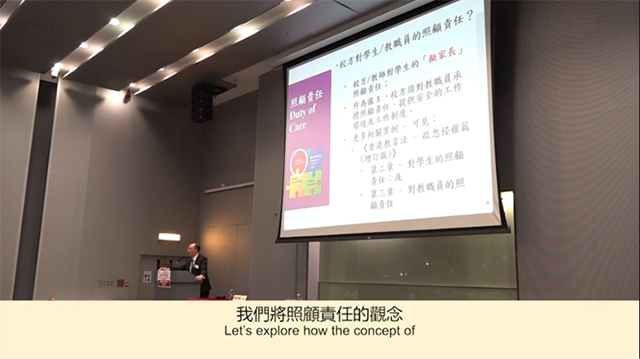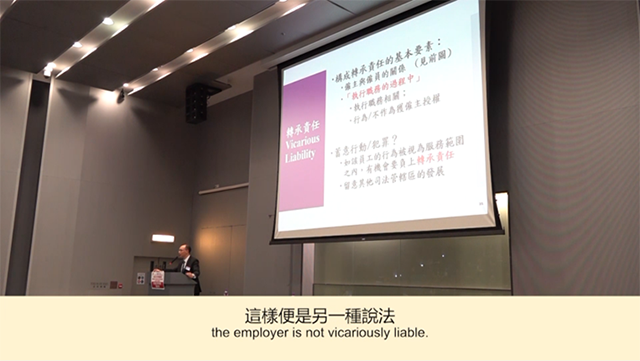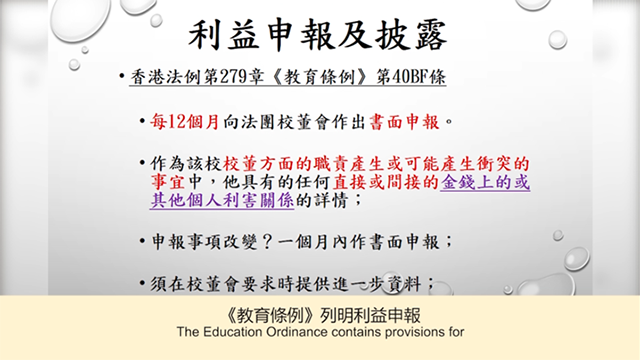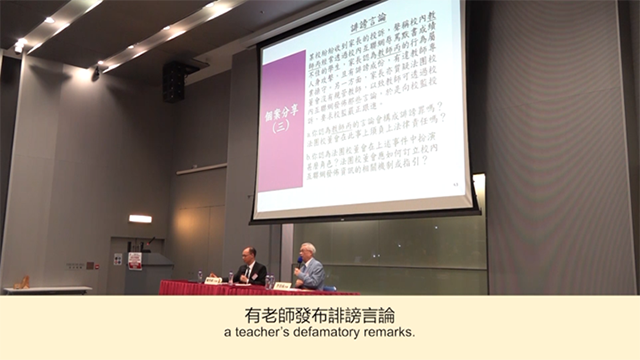Responsibilities of Managers
Suggested learning time: approximately 1 hour
This section provides highlights of the thematic seminars organised previously for school managers, so as to facilitate school managers to acquire, from the speakers’ explanation and case sharing in the video clips, knowledge related to school operation and governance, with a view to enhancing their governance capabilities.
Disclaimer
Views in the videos are purely shared by the speaker in his/her capacity. They are for reference only and should not be construed as legal advice or recommendation, which schools should obtain in each particular case if necessary.
Before watching the videos, please think about the following questions:
Questions
- As the employer of school staff, what legal liabilities does an IMC need to be aware of in order to safeguard their own interests?
- To protect school managers from any unwarranted suspicion or criticism that they are serving private interests, what provisions have been established by the Education Ordinance regarding potential conflicts of interests that may arise in their management duties?
Questions in Video
1. How do we define duty of care?
Please refer to the video from 0:05 to 2:10.
2. Does a school owe duty of care to its staff?
Please refer to the video from 2:24 to 3:07.
3. If a school does not comply with Section 38 of the Education Regulation by conducting a fire drill at least every six months, will the school contravene its duty of care?
Please refer to the video from 3:45 to 4:54.
Questions in Video
1. What is vicarious liability?
Please refer to the video from 0:18 to 1:26.
2. Must an employer be liable for all acts of its employees?
Please refer to the video from 1:29 to 3:44.
Video 3
Declaration and Disclosure of interests
(Speaker: Mr. Jacky YEUNG, Barrister)
[Video length: about 4 minutes]
Questions in Video
1. What is the difference between declaration of interests and disclosure of interests?
Please refer to the video from 0:12 to 2:28.
2. What is a register of interests?
Please refer to the video from 2:32 to 2:45.
3. What are the consequences if a manager does not declare and disclose interests in accordance with the provisions of the Education Ordinance?
Please refer to the video from 3:00 to 4:22.
Video 4
Defamation
(Speaker: Mr. Jacky YEUNG, Barrister and Rev. LEE Fu-sing)
[Video length: about 12 minutes]
This video uses a legal case as an example to explain how the school should properly handle complaints related to defamatory statements.
Case Background
A school has received several complaints from parents, claiming that Teacher C frequently criticises students who perform poorly in dictation via the school's intranet. The parents believe that Teacher C's behaviour constitutes personal attacks and contains defamation elements, violating the professional code of conduct for teachers. On the other hand, the parents also question the lack of supervision by the Incorporated Management Committee (IMC) over the teachers, allowing them to publish such defamatory statements through the school's intranet. As a result, the parents have lodged a complaint with the Supervisor, demanding rigorous follow-up actions.
Questions in Video
1. What is defamation?
Please refer to the video from 0:00 to 2:16.
2. Should the employer bear vicarious liability for defamation caused by his/her employees?
Please refer to the video from 4:42 to 5:04.
3. What actions should a school take when it receives demand letters from parents?
Please refer to the video from 6:32 to 10:05.
4. Should a school clearly define the purpose of each internal communication channel?
Please refer to the video from 11:24 to 12:17.
Suggested Follow-up Activities
Please read the EDB circulars related to staff appointment, promotion and succession arrangements such as the followings:
Regarding the content of the aforementioned videos or documents, please consider cases and review measures that are worth discussing or sharing in the IMC meeting.
Additional Reference Materials




